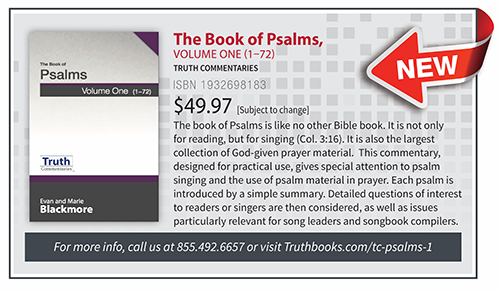

by Jerry King
Synopsis: While the world offers ineffective solutions that mask the misery that sin brings, Jesus offers the only effective solution—the peace of a restored relationship with God through the forgiveness of sin.
When I kept silent, my bones grew old through my groaning all the day long. For day and night Your hand was heavy upon me; my vitality was turned into the drought of summer. Selah (Ps. 32:3–4, NKJV).
The Maschil of David in Psalm 32, of which the above is part, is an ode to the war with self that is waged when one gives in to the desires of the flesh. David sinned, and the guilt of his sin was emotionally and physically tearing him apart. That is what sin does—to everyone! Why are so many people so miserable? Sin's guilt is gnawing away at them. Whether we like it or not, whether we admit it or not, humanity is hard-wired by God to feel guilt for sin. Why are so many people at war with one another, both individually and nationally? The misery of sin that gnaws away at the inside is typically manifested by warfare of some sort on the outside.
Sin is the world's disease, self–loathing and the resulting conflict are the world's symp-toms. The world tries to deal with self-loathing and conflict by prescribing painkillers. Narcotics (literal painkillers) might mask the inner misery of sin at some level, but they can never eliminate the disease itself, and so the misery will keep coming back and even grow worse. Self-esteem programs, racism and sexual abuse shamings, removal of statues, daily additions to the already overwhelming number of laws against antisocial conduct, and cease-fire initiatives between nations (figurative painkillers) might mask the symptoms of sin for a season, but they can never take away the disease.
As noted throughout this month's magazine, Jesus came to bring peace on earth. Jesus told His apostles on the eve of His death, "Peace I leave with you, My peace I give to you; not as the world gives do I give to you" (John 14:27). Jesus wanted His disciples to know that the peace He offered them was not the faux peace that they were accustomed to hearing the world offer—from false spiritual leaders who cried out, "Peace, peace," when there was no peace (Jer. 6:14)—but rather the true and lasting peace that comes through the removal of sin (Luke 7:48-50). Jesus offers peace with God, which is the only way to find true peace with self.
In the mid-1950s there was a song written for and sung by the International Children's Choir entitled "Let There Be Peace on Earth." The first two lines of that song are, "Let there be peace on earth, and let it begin with me." In one sense, that is an impossibility; peace on earth must begin with Jesus. Yet, in another sense (the sense that I believe the authors intended), it is correct; if I am going to find any peace on earth, it must begin with finding peace within myself and letting that inner peace flow out of me and influence my little portion of the world. My world can never be peaceful unless I first find peace in my inner man through Jesus Christ. That is the whole point of John 14:27, is it not?
Paul begins every single one of his epistles with a reminder to Christians that true and lasting peace comes from God, being the result of His grace. As the old saying goes, "No God, no peace; know God, know peace." It is this peace of the inner man that Paul describes as "the peace of God, which passes understanding, which will guard our hearts and minds through Jesus Christ" in Philippians 4:7. How is it attained? In verses 4-6 Paul attaches that peace to an understanding of and appreciation for what Jesus has done for us (what he calls "rejoicing in the Lord"), to a good attitude about our fellow man (what he calls "letting our gentleness be known to all men"), to a reminder of what life is all about (what he calls remembering that "the Lord is at hand"), and to trust in the power of prayer (what he calls "in everything by prayer and supplication, with thanksgiving, letting our requests be made known to God"). Do those four things, and Paul's promise is that the God of peace will give you peace.
However, like David, we sin. Like David, when we sin the inner peace that guards our hearts and minds is shattered. Also like David, as long as our sin is before us, we feel the heavy hand of God upon us, our vitality is turned into a drought, and our heart groans within us. What are we to do about that? Well, what did David do?
First, David acknowledged his sin to God. In Psalm 32:5, he wrote, "I said, 'I will confess my transgressions to the Lord,' and you forgave the iniquity of my sin." Will that work for us? John said it will: "If we confess our sins, He is faithful and just to forgive us our sins and to cleanse us from all unrighteousness" (1 John 1:9). If you have ever lived with hidden sin, you know what internal warfare is. If you have finally confessed that sin, you know the joy of renewed inner peace.
Second, David recommitted himself to godliness. In Psalm 32:6, he notes that it is only those who are committed to godliness who will find forgiveness when they pray for it. In Psalm 51, a psalm written after Nathan condemned him for his sins in the Bathsheba debacle, David not only pleaded for deliverance from the guilt of his sin (vv. 8, 14), but also pleaded that God would create in him a clean heart and renew in him a steadfast spirit (v. 10). If you have ever just confessed sin without a strong determination to live henceforth in godliness, you know the inner emptiness of such a confession. If you have confessed sin with a strong determination to leave that sinful conduct once and for all, you know the joy of renewed inner peace.
Thirdly, David put his sin behind him. In Psalm 32:10, he affirms His trust in His merciful Lord, and in v. 11 he invites those who likewise trust in the Lord to join him in shouts of gladness and joy. In Psalm 51:7, he expresses great confidence in the cleansing power of God's mercy: "Purge me with hyssop, and I shall be clean; wash me, and I shall be whiter than snow." And then, in the verses that follow, he writes of an overwhelming peace and joy that is possible only to those who possess that great confidence. The point is this: When David trusted in the Lord's forgiveness, he found it possible to forgive himself. Inner peace comes only to those who are able to do the same. If you have ever prayed for forgiveness only to find that you could not forgive yourself, you know the inner frustration of lack of trust in God. If you have put your sin behind you, you know the joy of renewed inner peace.Let there be peace on earth, and let it begin with peace in me–peace that comes only through obedience to and trust in Jesus Christ.
Author Bio: Jerry has worked with the West Allen church in Allen, TX for the last eleven years. He and his wife, Amy, have three children and three grandchildren. The church website is westallenchurch.org. He can be reached at jerryking1956@sbcglobal.net.
